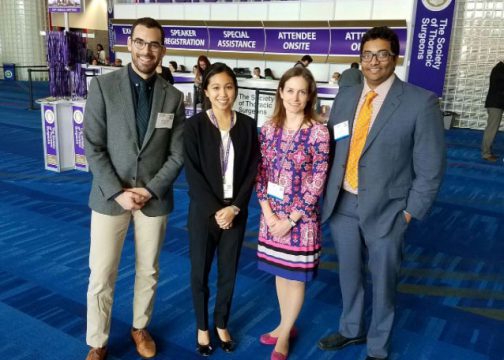Geisel School of Medicine students, Alyssa Flores ‘19 and Ace St. John ’18, were among 30 medical students awarded “Looking to the Future” scholarships to attend the Society of Thoracic Surgeons annual national meeting. A goal of the scholarship is to mentor aspiring cardiothoracic surgeons.
St. John’s interest in thoracic surgery began during his second year at Geisel through his OnDoctoring preceptor—giving him a close look at the clinical aspects of the field, and he found the role thoracic surgeons play in the lives of their seriously ill patients appealing.
“For me, attending this professional conference was a way to get a sense of what my life would look like if choose this specialty,” St. John says. “This is especially important as I begin to plan my fourth year of medical school and look ahead to my residency applications.”
Flores’ interest in the field began in Cardiovascular Physiology class during her first year at Geisel. She says that the substantial burden of cardiovascular disease made her want to learn more about cardiothoracic surgery and the culture of the field. “Science and technology have changed how we approach cardiovascular disease both medically and surgically,” she says, “and I am very interested in how that will continue to evolve.”
Her mentor, Alexander Iribarne, MD, MS, who is director of cardiac surgical research at Dartmouth-Hitchcock Medical Center, encouraged her to apply for the scholarship. “Dr. Iribarne has been really supportive and key to helping me navigate and understand the field since my first year,” Flores says. She has been working with Dr. Iribarne since then. In fact, they presented a research abstract at the Society of Thoracic Surgeons meeting about the use of bilateral internal mammary artery grafting in coronary bypass surgery.
As medical students attending a large, international meeting, neither Flores nor St. John knew what to expect. But once there, it was clear to them how thoughtfully the program had been designed. Scholarship recipients were paired with mentors who did their best to make medical students feel at home, and conference activities provided quality exposure to the field while facilitating a collegial environment—making it easy to meet representatives from residency programs at medical schools. Cardiothoracic surgeons are passionate about their field and Flores says their passion was evident throughout the conference and was very inspiring.

“Another special part of the STS scholarship was the mentorship program—I was paired with a female congenital heart surgeon, Dr. Lauren Kane from Texas Children’s Hospital, for the meeting,” Flores says. “I had not previously met a female cardiac surgeon before this, and she took me under her wing. We attended several research talks and went out to dinner with her clinical mentor.”
As a third-year student, St. John took advantage of the opportunity to meet attending physician from a variety of residency programs. “I was able to meet attending surgeons and residents from all around the country who took a genuine interest in my career goals. Making those connections was invaluable,” he notes. “This is how medical students grow from having an idealistic perception of medicine, to beginning to integrate yourself into the actual practice of medicine.”
Beyond making valuable connections, the conference presented the latest in cardiac surgery research in three fields: cardiothoracic, adult cardiac, and pediatric cardiac. There were plenty of career-building talks and workshops along with surgeons discussing the culture and future of cardiothoracic surgery.
“I’d suggest to anyone thinking about either cardiothoracic or general surgery to consider this scholarship because it really helped me to think realistically about my future as a resident and beyond,” St. John says. “It was very useful.”